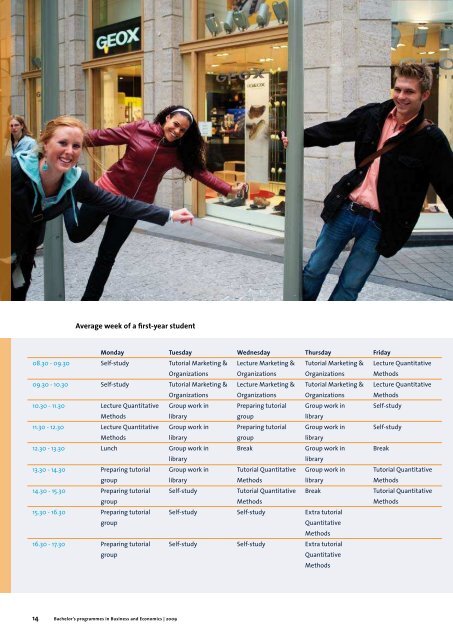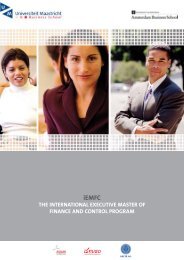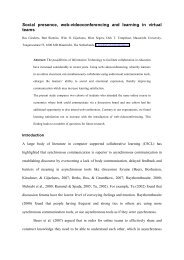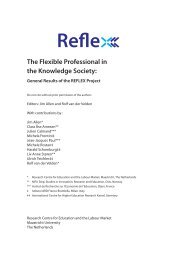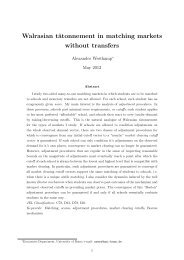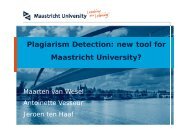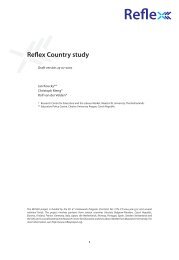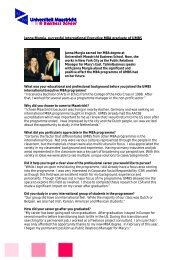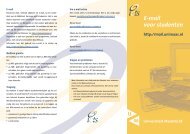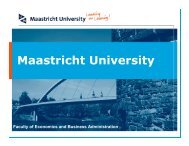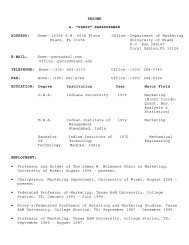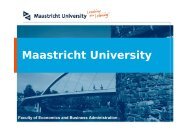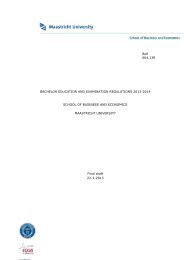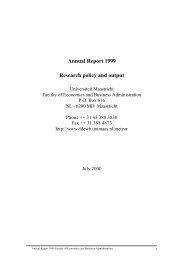Bachelor's programmes in Business and Economics | 2009
Bachelor's programmes in Business and Economics | 2009
Bachelor's programmes in Business and Economics | 2009
You also want an ePaper? Increase the reach of your titles
YUMPU automatically turns print PDFs into web optimized ePapers that Google loves.
08.30 - 09.30<br />
09.30 - 10.30<br />
10.30 - 11.30<br />
11.30 - 12.30<br />
12.30 - 13.30<br />
13.30 - 14.30<br />
14.30 - 15.30<br />
15.30 - 16.30<br />
16.30 - 17.30<br />
Average week of a first-year student<br />
Monday<br />
Self-study<br />
Self-study<br />
Lecture Quantitative<br />
Methods<br />
Lecture Quantitative<br />
Methods<br />
Lunch<br />
Prepar<strong>in</strong>g tutorial<br />
group<br />
Prepar<strong>in</strong>g tutorial<br />
group<br />
Prepar<strong>in</strong>g tutorial<br />
group<br />
Prepar<strong>in</strong>g tutorial<br />
group<br />
Tuesday<br />
Tutorial Market<strong>in</strong>g &<br />
Organizations<br />
Tutorial Market<strong>in</strong>g &<br />
Organizations<br />
Group work <strong>in</strong><br />
library<br />
Group work <strong>in</strong><br />
library<br />
Group work <strong>in</strong><br />
library<br />
Group work <strong>in</strong><br />
library<br />
Self-study<br />
Self-study<br />
Self-study<br />
Wednesday<br />
Lecture Market<strong>in</strong>g &<br />
Organizations<br />
Lecture Market<strong>in</strong>g &<br />
Organizations<br />
Prepar<strong>in</strong>g tutorial<br />
group<br />
Prepar<strong>in</strong>g tutorial<br />
group<br />
Break<br />
Tutorial Quantitative<br />
Methods<br />
Tutorial Quantitative<br />
Methods<br />
Self-study<br />
Self-study<br />
Thursday<br />
Tutorial Market<strong>in</strong>g &<br />
Organizations<br />
Tutorial Market<strong>in</strong>g &<br />
Organizations<br />
Group work <strong>in</strong><br />
library<br />
Group work <strong>in</strong><br />
library<br />
Group work <strong>in</strong><br />
library<br />
Group work <strong>in</strong><br />
library<br />
Break<br />
Extra tutorial<br />
Quantitative<br />
Methods<br />
Extra tutorial<br />
Quantitative<br />
Methods<br />
Friday<br />
Lecture Quantitative<br />
Methods<br />
Lecture Quantitative<br />
Methods<br />
Self-study<br />
Self-study<br />
Break<br />
Tutorial Quantitative<br />
Methods<br />
Tutorial Quantitative<br />
Methods<br />
There are several different types of courses that you<br />
will follow dur<strong>in</strong>g the course of your degree, whichever<br />
programme you choose. Hav<strong>in</strong>g completed each element,<br />
you will receive a certa<strong>in</strong> number of European Credit Transfer<br />
System (ECTS) credits, which contribute towards a total of 180<br />
for your entire bachelor’s degree (see table below). One credit<br />
represents a study load of 28 hours.<br />
• Skills tra<strong>in</strong><strong>in</strong>g (4 ECTS) – this comprises a short, practical<br />
course usually at the end of each semester.<br />
• Compulsory courses (6.5 ECTS) – all students must follow<br />
certa<strong>in</strong> compulsory courses <strong>in</strong> their first <strong>and</strong> second years.<br />
See course outl<strong>in</strong>es of <strong>in</strong>dividual <strong>programmes</strong> for details of<br />
the compulsory courses that apply to each programme.<br />
• Electives (6.5 ECTS) – <strong>in</strong> your third year, you will be able to<br />
choose from various elective courses that relate to your<br />
specialisation. See course outl<strong>in</strong>es of <strong>in</strong>dividual <strong>programmes</strong><br />
for details of the elective courses that apply to each<br />
specialisation.<br />
• Quantitative methods (4 or 6.5 ECTS) – these courses<br />
provide an <strong>in</strong>troduction to methodological topics that are<br />
quantitative <strong>in</strong> nature: mathematics, statistics <strong>and</strong><br />
computer science.<br />
• Study Abroad (26 ECTS) – with the exception of Fiscal<br />
<strong>Economics</strong> students, all students spend one semester<br />
study<strong>in</strong>g abroad at a partner <strong>in</strong>stitution <strong>in</strong> the third year.<br />
Alternatively, you can do an <strong>in</strong>ternship abroad, worth 26<br />
ECTS.<br />
• Internship (4 ECTS) – you have the opportunity to replace a<br />
skills tra<strong>in</strong><strong>in</strong>g course worth four ECTS credits with an<br />
<strong>in</strong>ternship. As part of the Infonomics programme, you can<br />
even organise an extended <strong>in</strong>ternational <strong>in</strong>ternship <strong>in</strong>stead<br />
of your study abroad.<br />
• Capstone assignment/bachelor’s thesis (4 ECTS) – the<br />
bachelor’s <strong>programmes</strong> end with an <strong>in</strong>dependently written<br />
essay of approx. 4,500-5,000 words, called a capstone<br />
assignment. The topic you choose should be consistent with<br />
your specialisation <strong>and</strong>/or elective. Econometrics <strong>and</strong><br />
Operations Research students must write a bachelor’s thesis<br />
<strong>in</strong>stead.<br />
For more <strong>in</strong>formation, see the study guide at:<br />
www.unimaas.nl/feba/studyguide<br />
14 Bachelor’s <strong>programmes</strong> <strong>in</strong> Bus<strong>in</strong>ess <strong>and</strong> <strong>Economics</strong> | <strong>2009</strong> 15<br />
Restaurant<br />
At Mensa, the faculty’s restaurant, you can buy a wide<br />
range of affordable meals <strong>and</strong> snacks. Every day, you can<br />
choose between two hot meals, a vegetarian dish, salads,<br />
s<strong>and</strong>wiches, dr<strong>in</strong>ks <strong>and</strong> many other delicious options.<br />
Student Services<br />
For student support services not related to your<br />
programme, Student Services is here to help. You can<br />
approach any of the advisors about matters relat<strong>in</strong>g to<br />
registration, studies, professions, career plann<strong>in</strong>g, f<strong>in</strong>ancial<br />
assistance <strong>and</strong> sports.<br />
www.ssc.unimaas.nl<br />
If you are a prospective student from outside the EU,<br />
you can visit the International Service Desk for help<br />
<strong>in</strong> apply<strong>in</strong>g for a visa, open<strong>in</strong>g a Dutch bank account,<br />
f<strong>in</strong>d<strong>in</strong>g accommodation, apply<strong>in</strong>g for <strong>in</strong>surance <strong>and</strong> so on.<br />
The International Service Desk also coord<strong>in</strong>ates several<br />
scholarship <strong>and</strong> grant <strong>programmes</strong>.<br />
The academic year<br />
The academic year is divided <strong>in</strong>to two semesters. Each<br />
semester comprises two periods of eight weeks <strong>and</strong> two<br />
periods of two weeks. Dur<strong>in</strong>g the eight-week periods,<br />
you will follow two courses at the same time. The twoweek<br />
periods are <strong>in</strong>tended for ‘additional’ courses, such<br />
as research methods <strong>and</strong> techniques, tra<strong>in</strong><strong>in</strong>g courses or<br />
skills tra<strong>in</strong><strong>in</strong>g. The content of the first <strong>and</strong> second year is<br />
the same for all students. This period is designed to give<br />
you the academic basis you will need for the rest of the<br />
programme. You will beg<strong>in</strong> to specialise <strong>in</strong> your third year.


